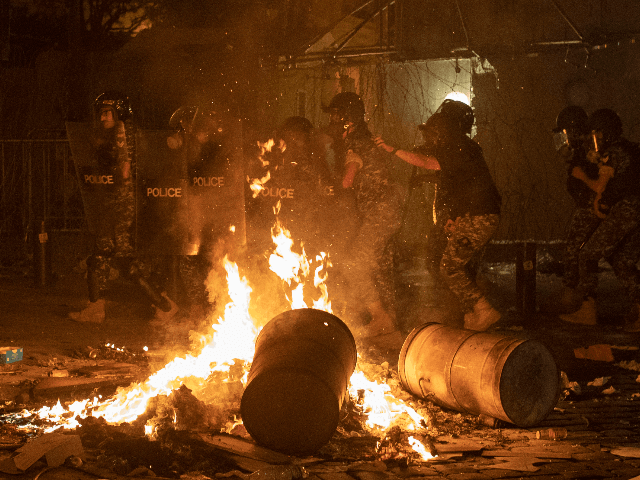Dozens of residents of Beirut, Lebanon, took to the streets late Thursday to demand accountability from their government after an explosion destroyed much of the city’s port area, leaving at least 150 dead, 5,000 injured, and hundreds of thousands homeless. Security forces responded by tear-gassing desperate residents.
Local journalists also reported being detained for simply trying to film the aftermath of the explosion closer to where it occurred. Reporter Edmond Sassine accused the government of only allowing foreign media to document the destruction.
The explosion on Tuesday occurred near the Port of Beirut and hollowed out multiple blocks of buildings. Closer to the epicenter, it destroyed critical grain supplies in a city already suffering food shortages, and an economic collapse that has resulted in a record-low valuation of the nation’s currency, the Lebanese pound. The destruction of the electric grid in the affected area has made search and rescue operations nearly impossible during night hours, suggesting that the casualty count is much higher than the few remains collected at press time.
Lebanese Prime Minister Hassan Diab revealed on Tuesday evening that officials believed 2,700 tons of ammonium nitrate, a highly combustible material used to manufacture explosives, had triggered the blast. Port officials had confiscated the material in 2013 and no one had moved it out of the densely populated area, despite the extreme danger its presence posed.
In an apparent response to popular outrage, Lebanese President Michel Aoun speculated on Friday that the blast could have been the result of a “rocket” or outside bombing, citing no evidence.
Lebanon had already experienced a year of nationwide protests against the corrupt incumbent regime prior to the blast. Thursday morning, when French President Emmanuel Macron toured the affected areas of the capital – making it there before Aoun – crowds of hundreds of victims of the blast surrounded the president, asking him to help them overthrow their government, chanting “Michel Aoun is a terrorist.”
Thursday evening, crowds had organized to demand a new government, triggering a large security presence. According to the New Arab, the protesters organized on a street leading to the nation’s parliament and may have been attempting to storm the building, apparently alarming local leaders and prompting the tear gas attack. The state-run National News Agency confirmed the use of tear gas, but justified it as necessary because those attacked had begun burning debris and attempting to loot what remained of stores on the block.
The Saudi news agency Al-Arabiya published a video showing a large, angry crowd taking over one street, but violent footage appeared to feature only a few individuals, as did the scenes showing police firing tear gas.
Agence France-Presse (AFP) reported that those left devastated by the explosion at the port are organizing “a large anti-government demonstration” for Saturday, dubbed “Hang Them by the Gallows.”
In addition to protests from civilians, Lebanese journalists are complaining that they are receiving worse treatment from their government than foreigners. On Friday, local broadcaster LBCI confirmed that the military had detained two employees, reporter Edmond Sassine and cameraman Paul Bou Aoun, for attempting to film the aftermath of the explosion close to the site. Al-Arabiya confirmed that another TV crew from the Lebanese network MTV was also arrested. Authorities released both crews relatively quickly, but sternly affirmed they were not allowed near ground zero.
Sassine confirmed his arrest on Twitter and said the army treated him and Aoun well, but protested that Lebanese journalists are banned from the Beirut port and “non-Lebanese media are not banned.”
He added that “senior officials,” not journalists, should be the ones arrested.
Prior to the protests Thursday, two Lebanese officials resigned from their posts in protest of the government’s incompetence. Lawmaker Marwan Hamadeh announced his resignation during an interview with Al-Arabiya, explaining, “I am no longer honored to be a member of institutions that watch the country’s devastation with a total bias that it destroyed and impoverished in front of the world, under an ineffective presidency, a government that is a monster that is only a mix of opposition and elite parties.”
Lebanese Ambassador to Jordan Tracy Chamoun also resigned following the explosion, condemning the government for “negligence and corruption.”
On Monday, prior to the blast, Lebanese Foreign Minister Nassif Hitti resigned from his post, calling Lebanon under the current government a “failed state.”
“I participated in this government on the basis that I have one employer named Lebanon, and I found in my country many employers and conflicting interests,” Hitti said in his resignation letter to Diab. “If they don’t come together around the interests of the Lebanese people and save them, then the ship, God forbid, will sink with everyone on board.”

COMMENTS
Please let us know if you're having issues with commenting.